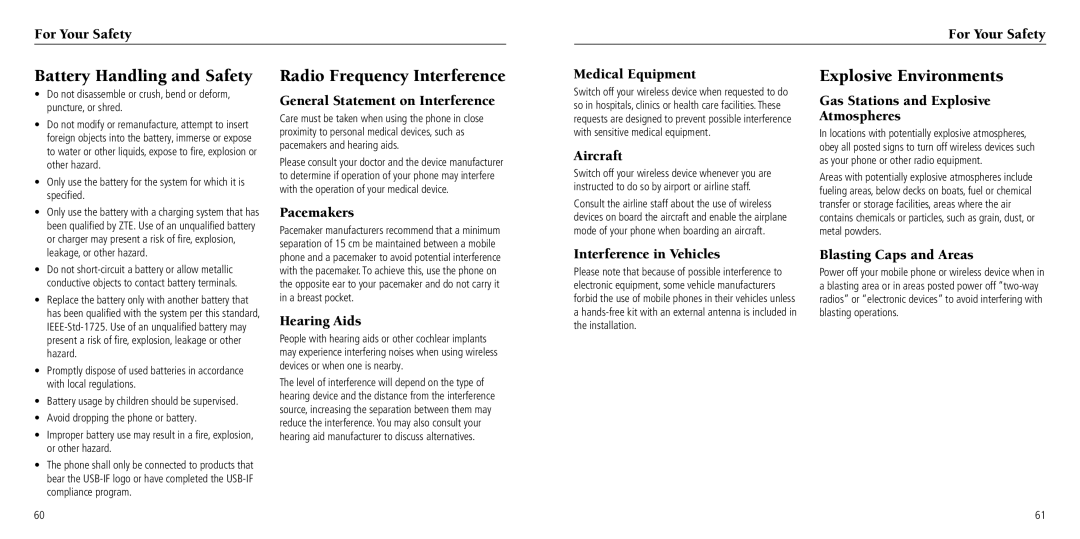For Your Safety
For Your Safety
Battery Handling and Safety
• Do not disassemble or crush, bend or deform, |
puncture, or shred. |
• Do not modify or remanufacture, attempt to insert |
foreign objects into the battery, immerse or expose |
to water or other liquids, expose to fire, explosion or |
other hazard. |
• Only use the battery for the system for which it is |
specified. |
• Only use the battery with a charging system that has |
been qualified by ZTE. Use of an unqualified battery |
or charger may present a risk of fire, explosion, |
Radio Frequency Interference
General Statement on Interference
Care must be taken when using the phone in close proximity to personal medical devices, such as pacemakers and hearing aids.
Please consult your doctor and the device manufacturer to determine if operation of your phone may interfere with the operation of your medical device.
Pacemakers
Pacemaker manufacturers recommend that a minimum separation of 15 cm be maintained between a mobile
Medical Equipment
Switch off your wireless device when requested to do so in hospitals, clinics or health care facilities. These requests are designed to prevent possible interference with sensitive medical equipment.
Aircraft
Switch off your wireless device whenever you are instructed to do so by airport or airline staff.
Consult the airline staff about the use of wireless devices on board the aircraft and enable the airplane mode of your phone when boarding an aircraft.
Explosive Environments
Gas Stations and Explosive Atmospheres
In locations with potentially explosive atmospheres, obey all posted signs to turn off wireless devices such as your phone or other radio equipment.
Areas with potentially explosive atmospheres include fueling areas, below decks on boats, fuel or chemical transfer or storage facilities, areas where the air contains chemicals or particles, such as grain, dust, or metal powders.
leakage, or other hazard. |
• Do not |
conductive objects to contact battery terminals. |
• Replace the battery only with another battery that |
has been qualified with the system per this standard, |
present a risk of fire, explosion, leakage or other |
hazard. |
• Promptly dispose of used batteries in accordance |
with local regulations. |
• Battery usage by children should be supervised. |
• Avoid dropping the phone or battery. |
• Improper battery use may result in a fire, explosion, |
or other hazard. |
• The phone shall only be connected to products that |
bear the |
compliance program. |
phone and a pacemaker to avoid potential interference with the pacemaker. To achieve this, use the phone on the opposite ear to your pacemaker and do not carry it in a breast pocket.
Hearing Aids
People with hearing aids or other cochlear implants may experience interfering noises when using wireless devices or when one is nearby.
The level of interference will depend on the type of hearing device and the distance from the interference source, increasing the separation between them may reduce the interference. You may also consult your hearing aid manufacturer to discuss alternatives.
Interference in Vehicles
Please note that because of possible interference to electronic equipment, some vehicle manufacturers forbid the use of mobile phones in their vehicles unless a
Blasting Caps and Areas
Power off your mobile phone or wireless device when in a blasting area or in areas posted power off
60
61
